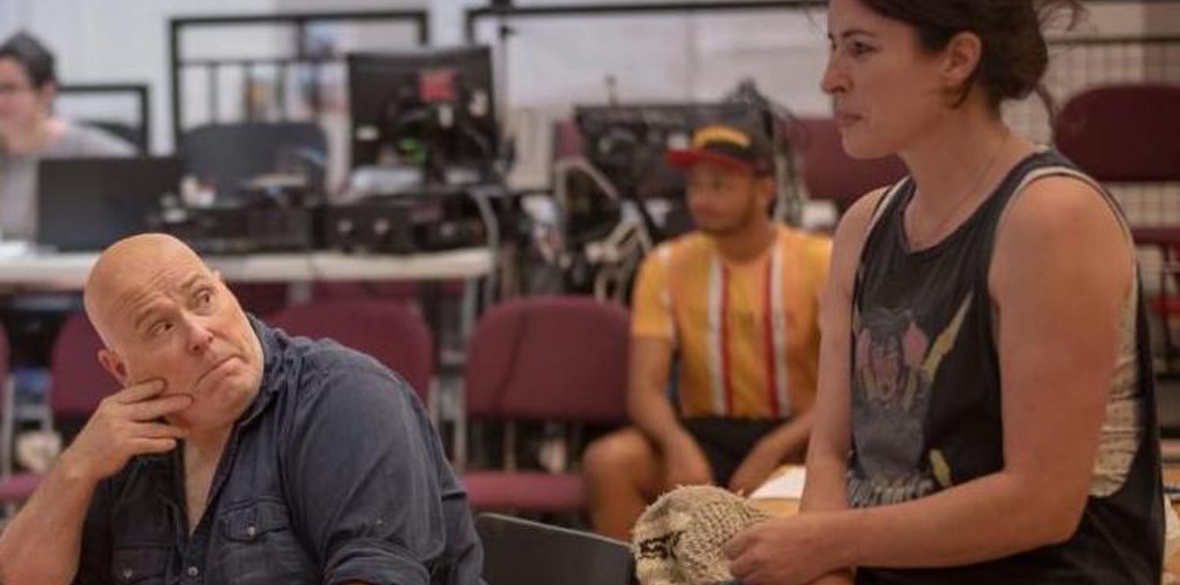This is the last article you can read this month
You can read more article this month
You can read more articles this month
Sorry your limit is up for this month
Reset on:
Please help support the Morning Star by subscribing here
AS AN artist in residence at the National Theatre, Alexander Zeldin is under a certain pressure to create work that speaks to the state of the nation.
But, unlike many playwrights who look to the upper echelons of society to try analyse the state we’re in — look no further than the lauded work James Graham and David Hare have had staged at the National over the years — Zeldin’s gaze is in the opposite direction.
Rather than the corridors of Westminster, Zeldin’s focus is on the margins of society, to examine what he describes as the “the intimate effects of austerity — the defining policy of the last 10 years.”
His debut play Beyond Caring, which transferred to the National after beginning life at Hackney Wick’s Yard Theatre, shone a light on the vulnerable existence of zero-hours cleaners in a meat-packing factory to devastating effect.
Two years later in 2016 Love arrived at the National, with Zeldin illuminating the lives of the many thousands of families stuck in limbo in temporary accommodation shelters across Britain.
Both plays stood out for their raw ability to convey the strain that poverty wages place on hard-working individuals and the mechanisms that people put in place to cope with it.
His new play Faith, Hope and Charity is about to open at the National to complete what’s an unintended trio thematically.
Catching up with him during a break in what sounds like an intense rehearsal period, he explains that the links between them grew organically from a desire to give voice to the voiceless.
“I didn’t set out to write them as a trio but it became clear that I was looking at people who, in many different ways, embodied the struggle of the individual trying to live their life and search for meaning.
“I guess they are all about fragile people’s search for happiness and the individual’s relationship to the system.”
More than that, they are about the hidden effects that austerity has placed on the most vulnerable in our society. As the writer-director travelled around the country with cast and crew to research his latest project they found that it was very often those who had very little themselves who were filling the gap for others in similar positions.
“There is this real sense of things only being able to keep going by the goodwill of people who are often themselves vulnerable,” he says.
When his team visited a foodbank in Sheffield, it was clear that “the support given is largely by people who themselves often have very little and are often suffering with physical or mental health problems.”
He is in no doubt where the blame for such an appalling situation lies. “The level of cuts that have happened under the coalition government and then the Conservatives have been so drastic as to create an accumulation of needs,” he stresses.
Some 25 per cent of the population are blamed for being vulnerable “and I think that that way of thinking has become increasingly prevalent in our public discourse and it saddens me."
Clearly fuelled by a desire for social justice and redistribution of wealth, it’s difficult not to see more than a hint of Ken Loach in his plays. Much like the stalwart of British cinema his work is designed to shock and he makes no attempt to disguise it.
“I want to confront people with an intimate, intense experience. I don’t want theatre to be comfortable. I don’t want it to be consensual. I want it to be a confrontation and I think being disturbed is positive.”
Anyone whose seen his previous plays will attest to the visceral quality of Zeldin’s work and Faith, Hope and Charity, promises more of the same. “This play is about care and nurture,” he tells me.
But how does he want us to extend our emotional response beyond the four walls of the theatre? After Love, which went on to be broadcast on BBC2, many viewers felt that a collection should be organised for the homeless but he’s looking for more than charity.
“I want the answer to that question to be difficult and then I think there is a chance for real change inside people, not just cosmetic let-me-solve-this-by-giving-a-tenner-a-month-type-change.”
As someone who thinks deeply about the effect of his plays and theatre more generally, the 34-year-old is clearly going to be a powerful voice in the years to come.
“Theatre has a responsibility to get behind the mirror of our time into the intimate experience of being alive today. That’s the ancient necessity of the theatre,” he contends.
Anyone concerned with the state of the nation and theatre’s role in changing it should make it a necessity to see his latest show.
Faith, Hope and Charity runs from September 9 to October 12, box office: nationaltheatre.org.uk.











